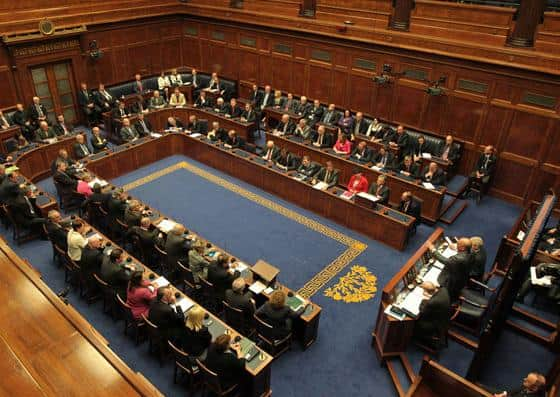Peter Robinson: Mandatory coalition was only ever a transitory fix at Stormont, and we now need to think about removing vetoes


It is so pleasing that we can all unite on something.
I accept that from time to time they make it easy for the public to participate in this activity and for the avoidance of doubt, I might have contributed to that myself once or twice.
When referring to politicians I use the third person pronoun ‘they’ only to convey my present cherished affiliation to that esteemed group of people who are called the general public and who have earnest opinions on almost everything. Because we carry no responsibility, we can demonstrate our superior wisdom by telling those who carry the can how they should do things or how they should have done better.


Advertisement
Hide AdAdvertisement
Hide AdThis gives rise to two points; the first and obvious one is that we, the general public, often have the benefit of levelling our criticism after the event when we see the outcome of decisions and secondly that if the advice of the general public was categorised it would be as diverse as that of our politicians and just as likely to lead to an impasse.
We seem to forget that the essence of democratic politics is the management of differing opinions.
It would be a dull vanilla world if we all thought the same and reacted in an identical fashion to events.
Yet, there are times when, in a national emergency, we expect greater effort to reconcile those accepted differences and we are entitled to hope that compromise can bring forth a workable plan for the greater good.
Advertisement
Hide AdAdvertisement
Hide AdCompromise is, of course, a two-way process and when reached it needs to be honoured.
Setting aside, the present crisis it is hard not to recognise that time will not improve nor, still less, heal the weaknesses of our mandatory coalition system.
It was right and logical in our divided society, in order to resurrect local political accountability, to devise a model of governance that all sections of our society could feel ownership of and with which they could identify.
After the St Andrews negotiations it was clear to most of us that this system could only be a transitory fix.
Advertisement
Hide AdAdvertisement
Hide AdWe said so then and strongly endorsed Mark Durkan’s comments in 2008 when he spoke of “preparing to think about how and when to remove some of the ugly scaffolding needed during the construction of the new edifice”.
In particular he rightly identified the need to reflect on the dangers of the decision-making protections acting as decision making preventions.
Indeed, my own experience convinced me that not only did those decision-making protections prevent some decisions being made but more often they unacceptably slowed down and impeded the process of arriving at any conclusion.
One of the great advantages a small nation should have is the speed of decision-making and the ability to act quickly while the large vessels around them are struggling to turn in the water.
Our cumbersome system wipes out this potential advantage.
Advertisement
Hide AdAdvertisement
Hide AdIn politics there is seldom a good time to make decisions for radical changes and it is true that some important improvements have come as a result of the agreement at St Andrews and those since, but the intrinsic fault-line remains.
I also accept that while we are in the midst of a pandemic it would be foolish to embark upon such work, but as soon as the shadow of Covid passes it would be timely for the preparatory work to begin.
While there are still many elements of our devolved settlement that require improvement, chief among them, in terms of urgency, relates to finding a means of democratic decision-making to obviate the use of the veto mechanisms.
I realise that those least enthusiastic about change will be those who can exercise control through its operation but if change does not come, stalemate or worse will.
Advertisement
Hide AdAdvertisement
Hide AdThese vetoes were placed within the structure’s operation at the behest of nationalists who regarded it as important to have protections they could fall back on if needed.
Nonetheless, perhaps there has been a shift over recent years that suggests unionists might have the greater need of safeguards.
Yet safeguards do not need to come in this form. The imperative in a democratic process is that decisions can be made, and deadlock avoided.
This will, on one occasion or another, leave one of the major parties unhappy and it will increase the role of smaller parties, but it will encourage greater compromise and certainty.
Advertisement
Hide AdAdvertisement
Hide AdI can recall a discussion on this issue during one of the many all-party talks processes. I offered to dispense with the whole cross-community veto process and thought it curious how some parties who complained about vetoes being deployed still wanted to retain vetoes on the matters they considered important.
It did not dawn on them that the representatives of one section of the community cannot define for others when and on what issues they believe their community needs safeguarded. If a limit is to be placed on the use of vetoes, then it must be properly balanced.
There have always been those who are so opposed to the new politics of Northern Ireland that they would bulldoze the whole Stormont edifice away. That is not the answer. But if Mark Durkan was right in 2008 to say we should prepare to think about how and when to remove some of the ugly scaffolding then unquestionably it is even more necessary today.
Change, if made, would protect our politicians from being criticised for failing to take decisions though nothing will protect them from being criticised for the ones they do take.
Advertisement
Hide AdAdvertisement
Hide Ad• Peter Robinson is a former DUP leader and first minister of Northern Ireland
——— ———
A message from the Editor:
Thank you for reading this story on our website. While I have your attention, I also have an important request to make of you.
With the coronavirus lockdown having a major impact on many of our advertisers — and consequently the revenue we receive — we are more reliant than ever on you taking out a digital subscription.
Subscribe to newsletter.co.uk and enjoy unlimited access to the best Northern Ireland and UK news and information online and on our app. With a digital subscription, you can read more than 5 articles, see fewer ads, enjoy faster load times, and get access to exclusive newsletters and content. Visit https://www.newsletter.co.uk/subscriptions now to sign up.
Advertisement
Hide AdAdvertisement
Hide AdOur journalism costs money and we rely on advertising, print and digital revenues to help to support them. By supporting us, we are able to support you in providing trusted, fact-checked content for this website.
Alistair Bushe
Editor